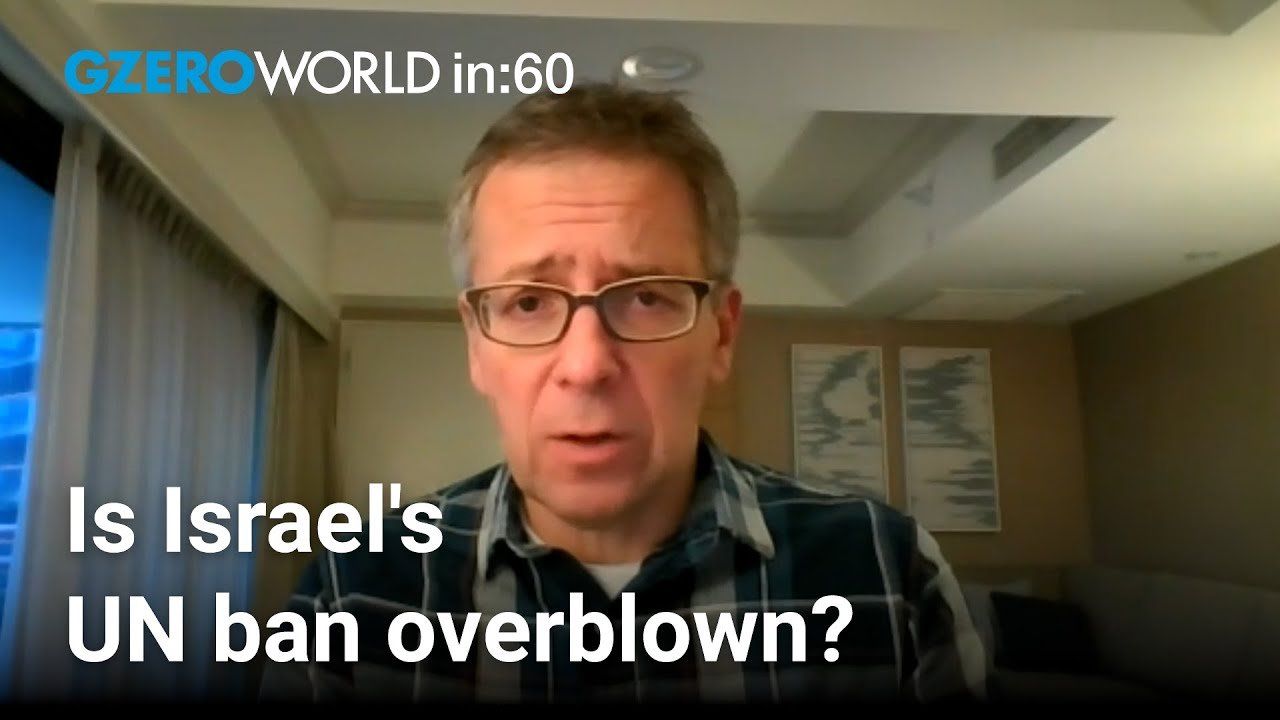Ian Bremmer shares his insights on global politics this week on World In :60.
Is Israel's UN ban a blow to peace efforts?
If it was permanent, I'd say yes as it is. I think we won't be talking about it in a few days. Look, obviously, on the back of these horrific terrorist attacks, everyone in Israel is on edge and more willing to lash out when they hear anything that sounds not 100% aligned with the message they want to hear. I'm empathetic to that, and I expect they're going to back away, especially because the Secretary-General has been consistent in talking about how he has condemned Hamas terrorist attacks. You know, anyone can pick a sentence and cherry-pick it for their purposes. That's what's happened here. I think it's unfortunate. The Global South will certainly align more with the Secretary-General, as they always do. But Antonio then doubled down and clarified his statement on Hamas all the way through. I think this will not be a big deal.
Will Qatar's diplomacy efforts secure the release of Gaza hostages?
Meaning more Gaza hostages. We've got four out so far. I certainly think a lot more can be released if there is further delay for Israel on the ground assault. And, you know, frankly, I think that there's very good reason for the Israelis to continue to hold off. I mean, the fact of the matter is, you will get more citizens, not military people that have been captured, and there are a bunch of those, too. But I think, you know, women, children, infirm, the aged, the willingness of Hamas to let them go, buy themselves time, get more international support as they do it, less condemnation and work with the Qataris is probably pretty high. So I do think that that's going to happen. But I'd be very surprised if the Israelis are willing to wait for like a month before the invasion. It does feel to me increasingly soon.
How will Erdoğan's stance on Hamas impact Turkey's standing with the Western world?
Well, I mean, it's not new that Erdoğan has had warm relations with Hamas, supported Hamas, and certainly has not considered them a terrorist organization as the United States does. He also has recently, after the terrorist attacks, refused to condemn them. That is a harder-line policy than we see even from the Kingdom of Saudi Arabia right now. And keep in mind, Turkey is a NATO ally. On the other hand, they're now letting the Sweden vote go through the parliament. So, I mean, the fact is that Turkey has always been a NATO's ally with challenges and they're never 100% aligned with the United States and most of Europe on most things. And this continues to be the case. But let's be clear that unlike the Russian invasion of Ukraine, where the entire West was aligned, on the Israeli response to the Hamas terrorist attacks, the West is not fully aligned. And certainly most of the world opposes Israel's military bombings. The extent of the bombings as well as the likely ground invasion. So in that regard, I think there's less to be seen here with Turkey's position.
That's it for me, and I'll talk to you all real soon.
More For You
Mastercard Economic Institute's Outlook 2026 explores the forces redefining global business. Tariffs, technology, and transformation define an adaptive economy for the year ahead. Expect moderate growth amid easing inflation, evolving fiscal policies, and rapid AI adoption, driving productivity. Digital transformation for SMEs and shifts in trade and consumer behavior will shape strategies worldwide. Stay ahead with insights to help navigate complexity and seize emerging opportunities. Learn more here.
Most Popular
Despite a ceasefire in Gaza, Israel is still not letting foreign journalists in to independently verify what’s happening on the ground, CNN’s Clarissa Ward tells Ian Bremmer on GZERO World.
On Ask Ian, Ian Bremmer breaks down the steady escalation of US pressure on Venezuela and why direct military action is now a real possibility.
From civil conflicts to trade wars to the rise of new technologies, GZERO runs through the stories that have shaped this year in geopolitics.
